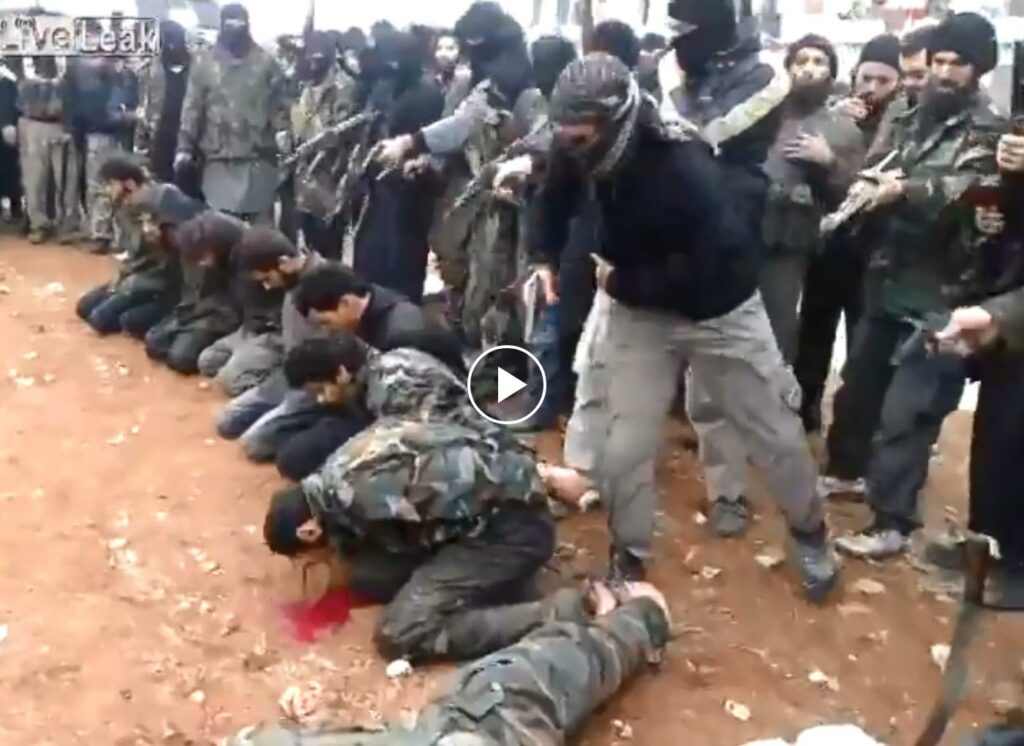NATO: From Covert Sponsor to Artillery Provider for Terrorists in Syria
SYRIA IN CONTEXT, 2 Mar 2020
Finian Cunningham | Strategic Culture Foundation - TRANSCEND Media Service
httpv://www.youtube.com/watch?v=aGgyMSaNHmc&feature=emb_logo
28 Feb 2020 – NATO member Turkey was recently caught out providing artillery support for terror groups in Syria’s Idlib province; now leader of the NATO alliance, the United States, is hinting at Russia and Syria holding dialogue with the terrorists to curb the upsurge in conflict.
As Syria’s endgame closes, the protagonists and their proxies are coming more clearly into focus. NATO’s covert shadowy connection with the jihadist insurgents it has sponsored for regime change is being flushed out as the Syrian army and its Russian ally home in on the last stand of the terror groups.
Russian Foreign Minister Sergei Lavrov this week ruled out any mediation with Tahrir Hayat al Sham (HTS), the main terrorist network holding out in Idlib in northwest Syria. Lavrov was referring to comments made earlier by US envoy James Jeffrey who suggested that HTS was “not a terrorist organization any more” and therefore might be included in negotiations for de-escalation.
The top Russian diplomat said the US envoy had previously dropped similar hints about rehabilitating HTS, formerly known as Nusra Front, an offshoot of the al Qaeda terror cartel, related to Islamic State (or ISIS). As Lavrov points out, these chameleonic groups are internationally proscribed terror organizations. They are not exempt from targeting under past de-escalation deals between Russia and Turkey.
It seems astounding that the US – which declares itself to be in a war against terrorism – is flagrantly acting as a mediator to spare these same terrorists from definitive military defeat.
The increasing violence in Syria over recent months is a result of jihadist militants continuing their attacks against civilians, as well as against the Syrian armed forces and their Russian allies in spite of several de-escalation attempts. The terrorists have used their areas of control in Idlib and Aleppo countryside to launch rocket attacks on government-controlled areas. Under the September 2018 deescalation agreement between Russia and Turkey, Ankara was obliged to facilitate a ceasefire by the jihadist groups which it is presumed to have influence over. But Turkey failed to implement its obligations.
Hence the Syrian government forces and their Russian ally were entitled to go after the culprits.
Turkey’s protests about the offensive serves to expose Ankara’s association with the terror groups. President Erdogan’s threats of deploying thousands of more troops in Syria’s north is in effect an admission of Turkey providing military support for the terrorists. It gives new meaning for the purpose of Turkish military observation posts along the border; more like command-and-assist posts.
Syria and Russia have previously accused Ankara of covertly supplying the terrorists with arms and cross-border logistics. What is quickly transpiring in the latest conflict phase is how Turkey’s state forces are openly participating with the illegally armed militants, as if the latter were a division of the Turkish army. Given Turkey’s NATO membership, the implication here is daunting: NATO, evidently, is in overt league with the terrorists waging war against Syria.
That collaboration was manifest last week on February 19 when Syrian army positions at Nayrab in Idlib came under attack from jihadist militants, believed to be HTS. The attack was supported by Turkish artillery and tank fire. Russian SU-24s were called in to repel the ground offensive. Two Turk troops were killed in the fighting.
Turkey’s Defense Minister HulusiAkar subsequently made an appeal to the US to supply Patriot air defense batteries. It is not clear if the US will actually take that step which would mark a dangerous escalation against Russian-backed Syrian forces.
The US and NATO envoys have, however, voiced renewed support for Turkey amid growing tensions with Syria and Russia.
It has long been suspected that the US and other NATO members have been arming the anti-government militants in Syria since the war erupted in 2011, including known terror groups, such as HTS and its myriad incarnations.
A recent auditing report by the Pentagon found that thousands of US weapons worth over $700 million have unaccountably gone missing from its military warehouses across the Middle East and in particular from arms depots in Kuwait and near the Jordanian-Syrian border. Militants in Syria have been documented as being armed with US-made shoulder-fired missiles (MANPADs) and anti-tank TOW rockets. The linkage to the Pentagon would therefore seem evident.
But what is emerging is the stark configuration of NATO troops alongside terror cadres on the battlefield.
The suggestion by US envoy James Jeffrey that Syria and Russia should talk terms with the terrorist HTS further demonstrates the allegiance between Washington, its NATO allies and the militants.
Syria, with the full support of Russia, has vowed to take back every inch of its territory from the foreign-backed insurgents who have done their utmost to destroy that state, committing unspeakable atrocities against the nation in the process.
International law mandates the Syrian government to take the battle to the end in order to crush and eradicate its enemies. No other state would tolerate anything less. We can only imagine the response by the US towards insurgents in its territory, and if Russia were to somehow call upon Washington to negotiate a truce.
Cornered in Idlib, the NATO powers are moving to salvage their terror proxies, by either giving them military cover or, as Washington is attempting to do, cut some slack through ceasefire negotiations.
_____________________________________________
 Finian Cunningham, originally from Belfast, Ireland is a prominent expert in international affairs. The author and media commentator was expelled from Bahrain in June 2011 for his critical journalism in which he highlighted human rights violations by the Western-backed regime. For many years, he worked as an editor and writer in the mainstream news media, including The Mirror, Irish Times and Independent. He is now based in East Africa where he is writing a book on Bahrain and the Arab Spring.
Finian Cunningham, originally from Belfast, Ireland is a prominent expert in international affairs. The author and media commentator was expelled from Bahrain in June 2011 for his critical journalism in which he highlighted human rights violations by the Western-backed regime. For many years, he worked as an editor and writer in the mainstream news media, including The Mirror, Irish Times and Independent. He is now based in East Africa where he is writing a book on Bahrain and the Arab Spring.
Go to Original – strategic-culture.org
Tags: Al-Qaeda, Chemical Weapons Attack, Fake Report, History, ISIS, Imperialism, Invasion, Media, Middle East, Military, Occupation, Politics, Power, Regime Change, Sanctions, Syria, Terrorism, USA, United Nations, Violence, War
DISCLAIMER: The statements, views and opinions expressed in pieces republished here are solely those of the authors and do not necessarily represent those of TMS. In accordance with title 17 U.S.C. section 107, this material is distributed without profit to those who have expressed a prior interest in receiving the included information for research and educational purposes. TMS has no affiliation whatsoever with the originator of this article nor is TMS endorsed or sponsored by the originator. “GO TO ORIGINAL” links are provided as a convenience to our readers and allow for verification of authenticity. However, as originating pages are often updated by their originating host sites, the versions posted may not match the versions our readers view when clicking the “GO TO ORIGINAL” links. This site contains copyrighted material the use of which has not always been specifically authorized by the copyright owner. We are making such material available in our efforts to advance understanding of environmental, political, human rights, economic, democracy, scientific, and social justice issues, etc. We believe this constitutes a ‘fair use’ of any such copyrighted material as provided for in section 107 of the US Copyright Law. In accordance with Title 17 U.S.C. Section 107, the material on this site is distributed without profit to those who have expressed a prior interest in receiving the included information for research and educational purposes. For more information go to: http://www.law.cornell.edu/uscode/17/107.shtml. If you wish to use copyrighted material from this site for purposes of your own that go beyond ‘fair use’, you must obtain permission from the copyright owner.
